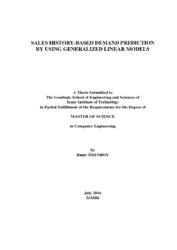Please use this identifier to cite or link to this item:
https://hdl.handle.net/11147/2868| Title: | Sales history-based demand prediction by using generalized linear models | Other Titles: | Genelleştirilmiş doğrusal modeller kullanarak satış geçmişi tabanlı talep tahminlemesi | Authors: | Özenboy, Başar | Advisors: | Tekir, Selma | Keywords: | Generalized linear models Data mining Mean square error Akaike’s information criterion Sales data |
Publisher: | Izmir Institute of Technology | Source: | Özenboy, B. (2016). Sales history-based demand prediction by using generalized linear models. Unpublished master's thesis, İzmir Institute of Technology, İzmir, Turkey | Abstract: | Improved data collection and storage capabilities make vast amounts of data available in appropriate formats. Commercial enterprises store their sales data. It’s vital for companies to accurately predict demand by utilizing the existing sales data. Such predictive analytics is a crucial part of their decision support systems to increase the profitability of the company. In predictive data analytics, the branch of regression modeling commonly is used to predict a numerical response variable like sales amount. In recent years, generalized linear models provide a generalization to better address the specificities of the problem at hand. To begin with, they relax the assumption of normally distributed error terms. Moreover, the relationship of the set of predictor variables and the response variable could be represented by a set of link functions rather than the sole choice of the identity function. This thesis models the sales amount prediction problem through the use of generalized linear models. Unique company sales data are explored and fitted accordingly with the right distribution function of the response variable along with an appropriate link function. The experimental results are compared with the other regression models, classification algorithms, and time series models. The model selection is performed via the use of MSE and AIC metrics respectively. Gelişmiş veri toplama ve depolama yetenekleri çok büyük miktarlardaki verileri uygun formatlarda erişilebilir hale getirmektedir. Birçok ticari firma kurumsal verilerini dijital ortamda saklayabilmektedir. Bu durumda, tahminleme analitiği firmaların karlılıklarını yükseltmek için karar destek sistemlerinin önemli bir parçası haline gelmiştir. Tahminleme analitiğinde, regresyon modelleme dalı genellikle satış miktarı gibi nümerik yanıt değişkeninin tahminlemesinde kullanılır. Son yıllarda, genelleştirilmiş doğrusal modeller ele alınan problemleri daha iyi adresleyen bir genelleştirme sağlamak için kullanılmaya başlanmıştır. İlk olarak, modellerdeki hata terimlerinin normal dağıldığı varsayımından vazgeçilmiş, daha sonra, tahmin değişkenleri ile yanıt değişkeni arasındaki ilişki tek bir birim fonksiyonu yerine bağ fonksiyonları ile ifade edilmiştir. Bu tezin kapsamında genelleştirilmiş doğrusal modeller kullanılarak satış miktarı tahminleme probleminin modellemesi çalışması yapılmıştır. Bir firmaya ait satış verileri keşifçi veri analizi teknikleri ile incelenmiştir. Yanıt değişkeninin uyum gösterdiği olasılık dağılımına göre uygun bir bağ fonksiyonu kullanılmıştır. Deneysel sonuçlar diğer regresyon modelleri, sınıflandırma algoritmaları ve zaman serileri modelleri ile karşılaştırılmıştır. Model seçimi Akaike ölçütü (AIC) ve ortalama hata kareleri (MSE) metrikleri kullanılarak uygulanmıştır. |
Description: | Thesis (Master)--Izmir Institute of Technology, Computer Engineering, Izmir, 2016 Full text release delayed at author's request until 2016.11.01 Includes bibliographical references (leaves: 99-101) xii, 101 leaves |
URI: | http://hdl.handle.net/11147/2868 |
| Appears in Collections: | Master Degree / Yüksek Lisans Tezleri |
Files in This Item:
| File | Description | Size | Format | |
|---|---|---|---|---|
| T001484.pdf | MasterThesis | 2.38 MB | Adobe PDF |  View/Open |
CORE Recommender
Page view(s)
118
checked on Apr 15, 2024
Download(s)
36
checked on Apr 15, 2024
Google ScholarTM
Check
Items in GCRIS Repository are protected by copyright, with all rights reserved, unless otherwise indicated.